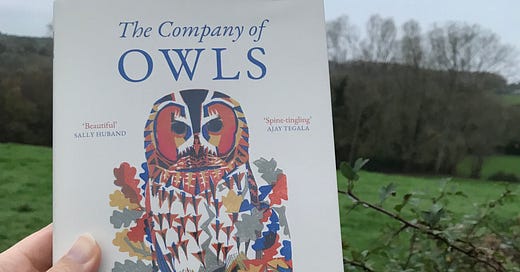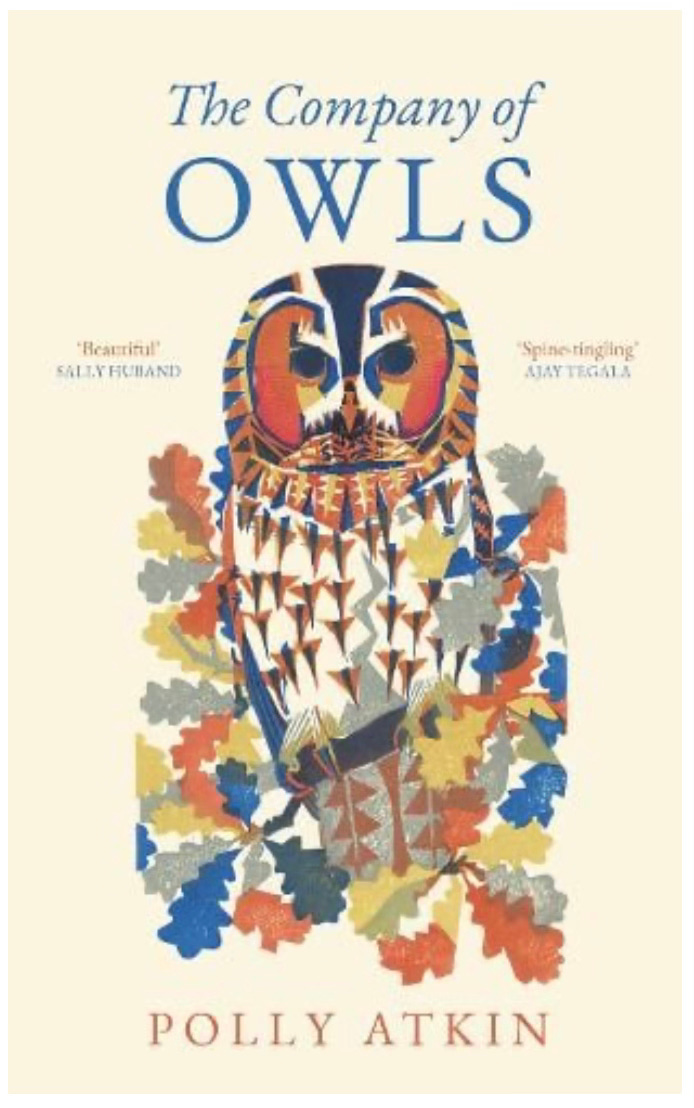The Company of Owls by Polly Atkin
A book review (& last minute Christmas gifts for your favourite writers)
The Company of Owls, published in November by Elliott & Thompson, is the most wonderful invitation to walk and sit with the poet Polly Atkin. Stillness and observation are key skills learned from living in a chronically ill body that have helped Polly to follow the life of the tawny owls in Grasmere. It is her slowness that helps her to find and track the owls as they go about their usual owl-ish business: hunting, raising a family, following the life of their owlets as they grow and branch. Polly charts this beautifully and lyrically, interspersed with personal reflections and wider contexts of research and knowledge. She pointedly demonstrates how little is known about owls, how hard they have been proclaimed to study. Her observations of the research are also interesting, how animals have been stripped of emotion in traditional nature writing. Anthropomorphising them is deemed unscientific. Yet there is a third way that Polly explores, of the possibility of a propensity for animals to love, to engage in behaviours very similar to what we would class as love if they were witnessed in human animals. She poses the question, if we can feel love then what is the possibility that other species can too? Her writing nudges us to reconsider what we might assume of animals and their relationships with one another, and with us. It pokes at the presumption of species hierarchies.
Reading this book at bedtime has been a gentle companionable pleasure. I looked forward to spending time with Polly and the owls at the end of each day, savouring each chapter and eeking out the book for as long as I could.
Polly starts with the following opening passage:
“Let me tell you about my neighbours, the owls.
Let me tell you about what I have learnt of them, the ways of them, over the years I have lived alongside them. Their lives of nighthunt and dayrest, their lives amongst trees and their lives amongst houses. Let me tell you what I have learnt about everything else through them. About difference and aloneness and companionship and difficulty. About sensitivity and materiality. About watchfulness and vocalness. About survival and joy. About the choices we make to protect those we care for and the choices we make to protect ourselves. About knowing which to focus on at any one time. When to tolerate disruption, when to leave. Let me tell you what I know and let me tell you about everything I don’t know. That this too is a kind of knowledge you might find in a twilit wood, or in the small hours, as you sit alert, listening for proof that you are not the only living thing left after all.”
Polly writes about the owl as a symbol of solitude. Her own reflections include the time that began the book, the first spring lockdown in the UK of 2020. As well as walking through Grasmere and tracking the owls, Polly began making ink drawings of particular words. Spurred by dwelling on solitude, companionship, isolation, and separation, and all the nuances and differences between each. She contemplated anchoresses and their contemporaries. In particular landing on Margery Kempe, author of what is believed to be the first autobiography written in English. Polly began to write down four words from the text:
“uplokkid, recluse, onlihede and solnes - and traced them in water on thick paper before adding ink. I repeated them and repeated them as though in the repetition some sense would resolve from the seeping colour. How it revealed the structure that was already there, but barely perceptible. How it made something beautiful from it. But the more times I wrote the words out, the more shades of meaning leached from my brushstrokes. The more ambiguous I felt my state of seclusion to be, the more ambiguous I felt about isolation.
Uplokkid means locked up, enclosed - but also implies protection, sanctuary. To be contained is not always to be restricted…
Like many disabled people, I knew at that time I was safer enclosed and contained, in a world in which others are similarly enclosed and contained. Like medieval mystics in their anchorages, my mind was on the long-term rewards of short-term sacrifices. I found myself embracing solitude for a higher purpose: not holiness, but haleness, wholeness. Health. Long-term survival…”
These are words she continues to dwell on and unpack throughout the book, in between illustrating more detail about different species of owl, different assumptions and knowledge and research of owls more broadly around the world, as well as studying the Grasmere owls.
There is a lightness of touch to Polly’s parallels between her personal experiences and her observations of the owls. Referenced at times through the text, her body and chronic illness is not the focus, the owls are, but it is context of her own perspective, the perspective which enables her to be at such close proximity to the owls. It is in living at a slower pace, with a smaller perimeter for her regular walks, that lent itself to such close observation, such level of knowledge she was able to gain.
The Company of Owls is a gorgeous book, as much to dwell in the company of Polly Atkin in pursuit of the owls, as the owls themselves. Both are excellent companions.
Signed copies are available from Sam Read Books, Grasmere.
Last minute Christmas gifts to support your favourite writers:
Writers are by and large poorly compensated for their time and work. Much of it, for most people, is not compensated at all. Aside adopting a writer, and perhaps that’s an idea for another post, you can show your love in other ways - ways that do not need to cost a thing.
Posting a positive review on Amaz*n and other bookselling sites will be enormously appreciated. Tell other readers you loved the book. Ratings and reviews really help to get other people to see your favourite books.
Talk to your friends and recommend books you love to them. Share the books you love on social media.
Use your local library. Borrowing books is another great way to read excellent work without costing anything, but that still brings in a small payment to the authors.
If you’re buying books support local independent shops when you can. Bookshops and libraries are the lifeblood of publishing, promoting excellent writing and writers.
Share, like, and comment on posts and subscribe to newsletters (like this one!).
Thank you for reading & supporting Moving Mountains this year. Happy Christmas and all good wishes for the year ahead!





